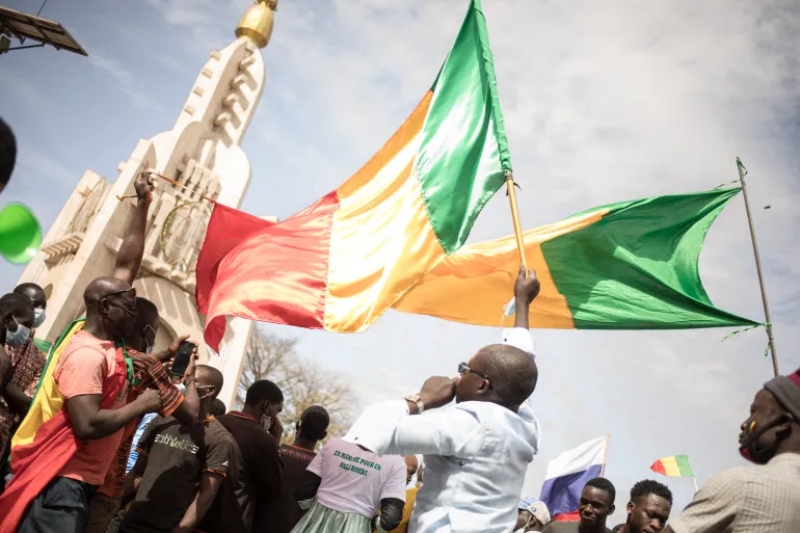The Unraveling Rift with ECOWAS
In a historic move, Niger, Mali, and Burkina Faso have officially declared their exit from the Economic Community of West African States (ECOWAS), citing “illegitimate, inhumane, and irresponsible” sanctions imposed by the regional bloc in response to their recent coups. This withdrawal marks the first time any member has disengaged from ECOWAS since its inception in 1975, dealing a significant blow to the organization’s credibility and unity.
The military juntas of the three countries accuse ECOWAS of failing to provide adequate support during their transitions and imply that the bloc’s actions limited their ability to control their own destinies in a joint statement. This rupture in relations brings into question the effectiveness of ECOWAS in addressing internal crises and maintaining stability in a region grappling with political instability.
ECOWAS is losing ground among West Africans.
Critics argue that ECOWAS is losing goodwill among West Africans who feel the organization is not adequately serving their interests. The perception of ECOWAS as an exclusive club benefiting leaders rather than citizens is gaining traction, according to Oge Onubogu of the Wilson Center think tank. The discontent raises concerns about the organization’s ability to fulfill its original mandate of promoting cooperation, raising living standards, and enhancing economic stability in the region.
While ECOWAS claims it has not been officially notified of the exit, the disengagement process requires a one-year written notice. The withdrawal of these key nations challenges the very foundation of ECOWAS and prompts a reassessment of its role in addressing the evolving needs of West African states.
Keep Reading
Impact of Disengagement on Regional Stability
The unprecedented exit of Niger, Mali, and Burkina Faso from ECOWAS has far-reaching implications for regional stability. The breakdown in relations, fueled by disagreements over sanctions, may result in prolonged political transitions and an increased risk of coups in other countries. Analysts express concerns that, without ECOWAS oversight, the return to democratic governance in the affected nations could face further delays.
Ryan Cummings, director of Signal Risk, suggests that the departure allows these nations to avoid previous transitional deadlines set by ECOWAS. This potential delay in the return to democracy raises questions about the effectiveness of ECOWAS in achieving its primary goals in the face of political upheaval.
Russia’s Emerging Role in West Africa
The exit of Niger, Mali, and Burkina Faso from ECOWAS opens the door for alternative partnerships, with Russia emerging as a potential player. The strained relations between the coup-led governments and the West, coupled with Russia’s willingness to engage, pave the way for expanded Russian influence in the region.
Russian mercenary outfit Wagner’s presence in Mali and recent developments in Burkina Faso highlight Russia’s strategic interests in West Africa. The Kremlin’s overtures to these nations, emphasizing non-colonial history and anti-French sentiment, signal a shift in geopolitical dynamics. Burkina Faso’s state-run media even reported Russian forces arriving to strengthen military and strategic cooperation.
Security Concerns and Human Rights Implications
As these nations align themselves with Russia, concerns about security and human rights violations arise. Wagner, known for its presence in conflict zones, has faced allegations of human rights abuses. The consequences of deepening ties with Russia may exacerbate existing security crises in the region, raising questions about the impact on local populations and stability.
Analysts remain uncertain about the extent of support these nations might receive from Russia and the potential consequences of this alignment on both regional and international levels. The geopolitical landscape in West Africa is undergoing a significant transformation, with implications for global powers and the delicate balance of stability in the region.
A Turning Point for ECOWAS and West Africa
The exit of Niger, Mali, and Burkina Faso from ECOWAS marks a pivotal moment in the organization’s history and raises concerns about its ability to navigate and address evolving challenges in West Africa. The geopolitical shift towards Russia introduces new complexities with potential repercussions on regional stability and international relations.
As these nations forge new partnerships outside the ECOWAS framework, the impact on democracy, governance, and the overall well-being of their citizens remains uncertain. The international community watches closely as West Africa grapples with this unprecedented crisis, understanding that the decisions made in the coming months will shape the region’s trajectory for years to come.

